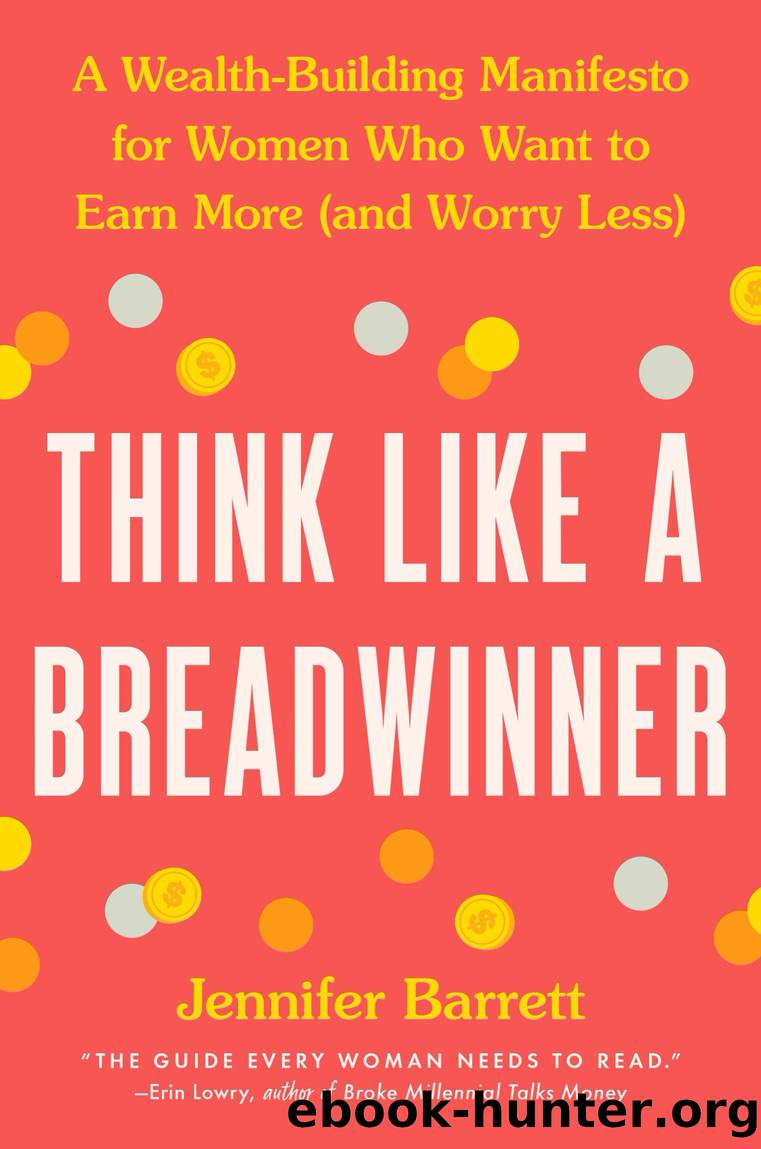Think Like a Breadwinner by Jennifer Barrett

Author:Jennifer Barrett [Barrett, Jennifer]
Language: eng
Format: epub
Publisher: Penguin Publishing Group
Published: 2021-04-06T00:00:00+00:00
Lesson #7: Working Harder Than You Have to Is a Waste of Time
For months I was mystified by how chill my good friendâs husband, Clinton, was about his job. He came home consistently at the same time. When he wasnât at work, he wasnât talking or even thinking about itâor didnât seem to be, anyway. In fact, he was building a completely separate business as a speaker on the side. And he often spent his downtime writing, practicing, and giving talks, or taking workshops to hone those skills. Yet he was in a senior management role at work and the primary breadwinner in their marriage. How was he able to disconnect and still be effective in his job? I felt like I was thinking about work almost all the time, and often doing some on weekends.
When I asked him about it, he told me that as long as he was hitting his targets (and he was) and his boss and his team were happy, he didnât need to put in any extra effort. Putting in additional effortâespecially when he had outside interests that he wanted to have enough headspace and energy to pursueâwould have been a waste of his time.
It seems so logical, but this was a mind-blowing revelation to me. The more I thought about it, the more I realized this is the major mindset shift many of us need. In fact, working harder and longer hours can often be counterproductive. Devoting valuable time and energy to a job during our off-hours keeps us from being fully present with family and friends. It can undermine the kinds of outside pursuits that can pay off more in the long run. Itâs not serving us. And frankly, it may not be serving our employers either.
Despite our countryâs glorification of overworkâsurveys have found that one-third of Americans work on the weekend and a quarter do work between 10:00 p.m. and 6:00 a.m. during the weekâthe data show that working more doesnât necessarily produce better results. In fact, it doesnât take long to reach a point of diminishing returns. Stanford researchers estimate that after about forty-eight hours a week, or an average of nine and a half hours a day, a workerâs output drops sharply. And, if Clintonâs example werenât compelling enough, a group of economics researchers released a study in April 2019 that found working longer hours than someone else in the same job doesnât even earn you more money! It can actually lead to a 1 percent decrease in wages.
Yet women in particular have been conditioned to draw a correlation between the amount of time and effort we exert and the results we produce. Itâs not just about proving our value. At school, we learned that if we worked harder, weâd be rewarded. Putting in extra timeâdoing extra-credit workâresulted in better grades and commendations. But the same doesnât hold true in the workplace.
Lisa Damour, a psychologist who wrote a book about stress and anxiety in teenage girls, noticed in her own
Download
This site does not store any files on its server. We only index and link to content provided by other sites. Please contact the content providers to delete copyright contents if any and email us, we'll remove relevant links or contents immediately.
Professional Troublemaker by Luvvie Ajayi Jones(28962)
Whiskey Words & a Shovel I by r.h. Sin(18833)
Rewire Your Anxious Brain by Catherine M. Pittman(17589)
Healthy Aging For Dummies by Brent Agin & Sharon Perkins RN(16608)
Cat's cradle by Kurt Vonnegut(13866)
Talking to Strangers by Malcolm Gladwell(11876)
The Art of Thinking Clearly by Rolf Dobelli(8841)
They Both Die at the End by Adam Silvera(8611)
Doing It: Let's Talk About Sex... by Hannah Witton(8548)
The 5 Love Languages: The Secret to Love That Lasts by Gary Chapman(8494)
Thirteen Reasons Why by Jay Asher(7788)
Wonder by R.J. Palacio(7732)
Goodbye, Things by Fumio Sasaki(7726)
The Compound Effect by Darren Hardy(7557)
Atomic Habits: Tiny Changes, Remarkable Results by James Clear(7210)
Becoming Supernatural by Dr. Joe Dispenza(7105)
Wonder by R. J. Palacio(7058)
Tools of Titans by Timothy Ferriss(6945)
Should I Stay or Should I Go? by Ramani Durvasula(6784)
